The Impact of Employee Motivation on Retention: A Research Proposal
VerifiedAdded on 2023/04/21
|19
|5433
|52
Report
AI Summary
This research proposal examines the relationship between employee motivation and retention within the hospitality sector, with a specific focus on the Intercontinental Hotel in Dublin. The study aims to identify factors that enhance employee motivation and determine how this motivation impacts employee retention rates. The proposal outlines the research objectives, which include identifying motivational factors, analyzing the dependence of retention on motivation, and suggesting strategies to improve retention. The methodology section details the research philosophy, approach, and data collection methods, including the use of the Mobley model for understanding staff turnover. The literature review covers employee motivation, financial and non-financial incentives, and employee retention strategies. The study aims to contribute to the understanding of how to create a work environment that encourages employee satisfaction and reduces turnover, ultimately improving the quality of services offered by the hotel. The proposal also discusses the significance of employee motivation in the hospitality industry, emphasizing the need for effective strategies to retain quality employees and maintain a competitive advantage.
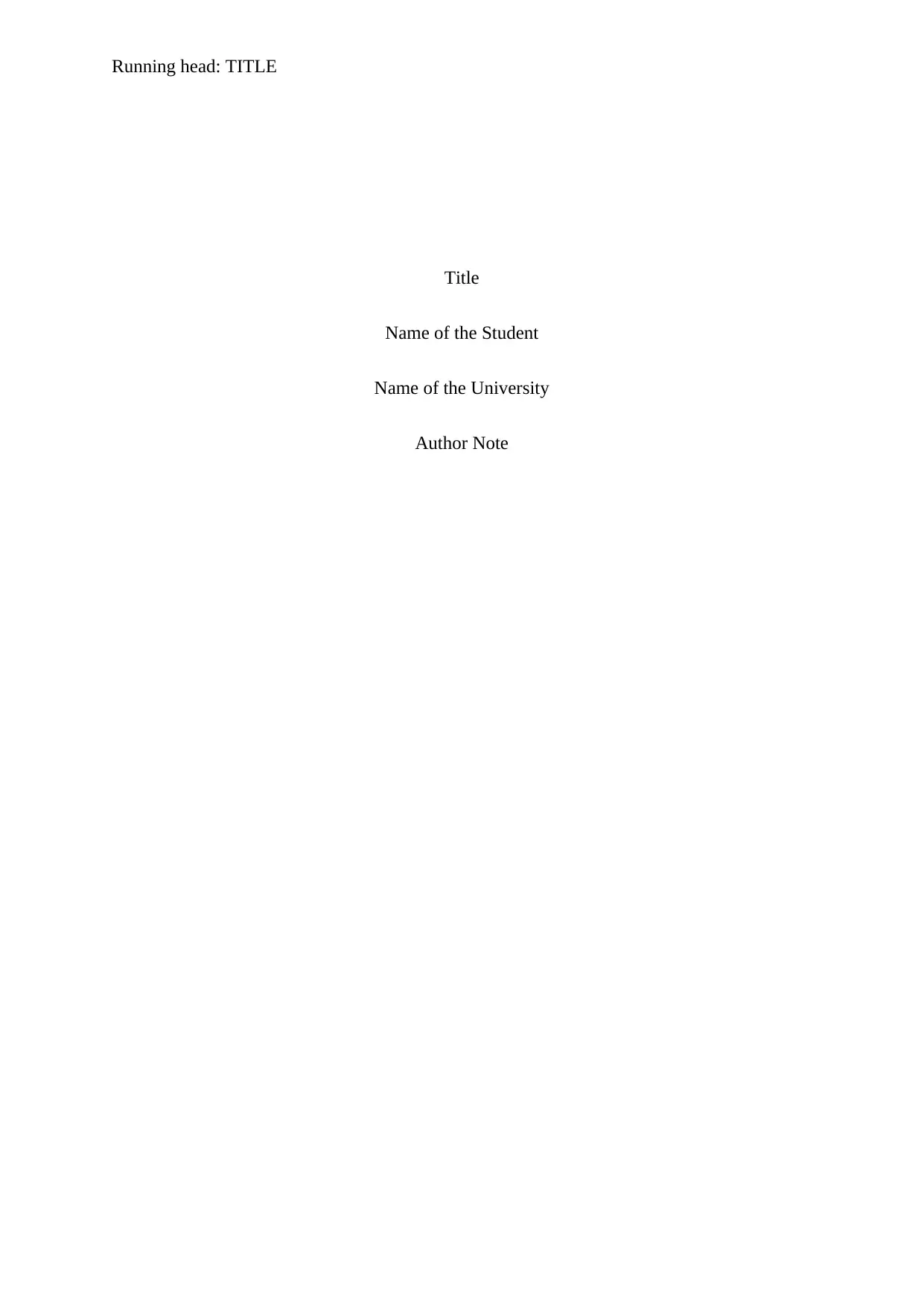
Running head: TITLE
Title
Name of the Student
Name of the University
Author Note
Title
Name of the Student
Name of the University
Author Note
Paraphrase This Document
Need a fresh take? Get an instant paraphrase of this document with our AI Paraphraser
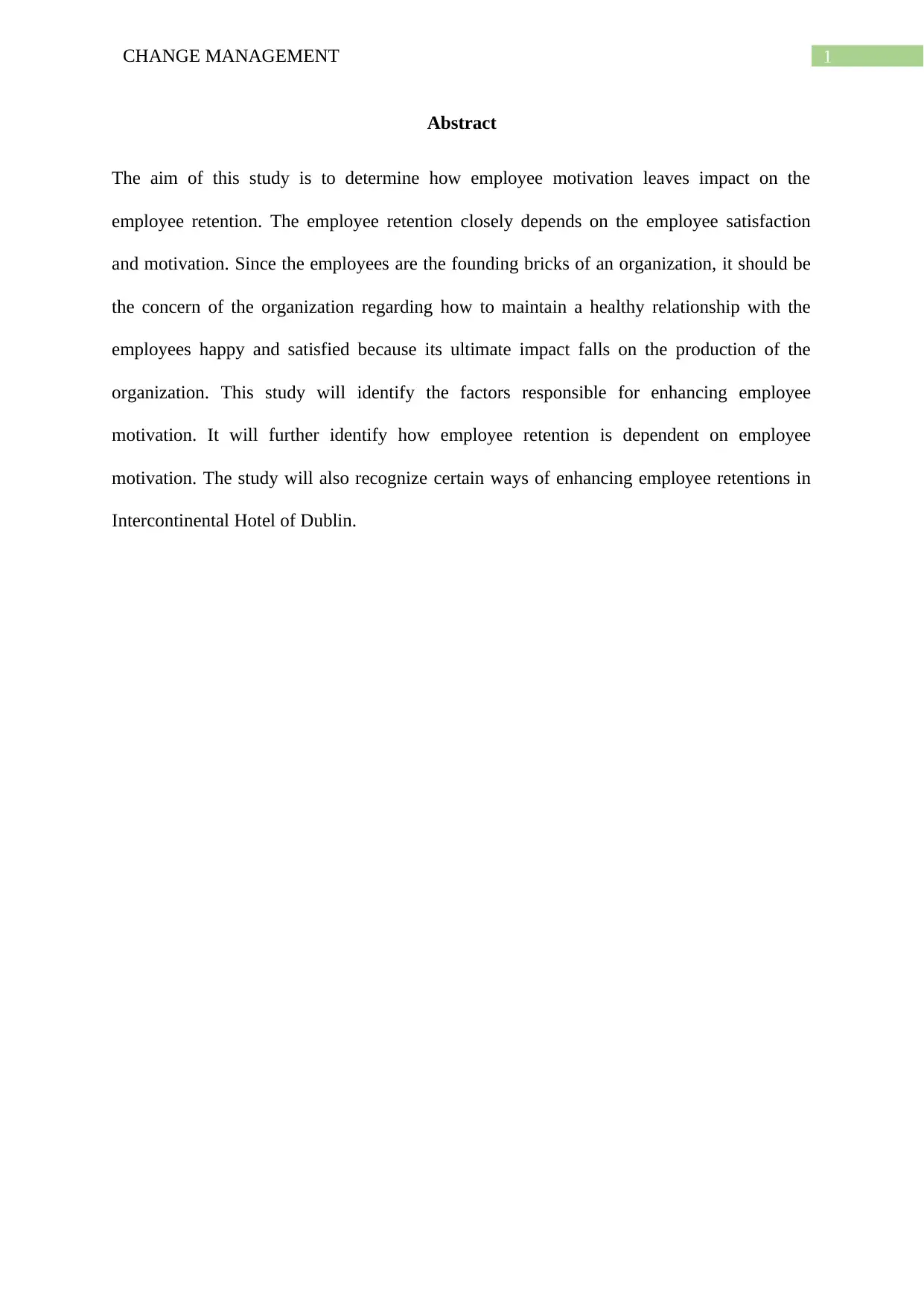
1CHANGE MANAGEMENT
Abstract
The aim of this study is to determine how employee motivation leaves impact on the
employee retention. The employee retention closely depends on the employee satisfaction
and motivation. Since the employees are the founding bricks of an organization, it should be
the concern of the organization regarding how to maintain a healthy relationship with the
employees happy and satisfied because its ultimate impact falls on the production of the
organization. This study will identify the factors responsible for enhancing employee
motivation. It will further identify how employee retention is dependent on employee
motivation. The study will also recognize certain ways of enhancing employee retentions in
Intercontinental Hotel of Dublin.
Abstract
The aim of this study is to determine how employee motivation leaves impact on the
employee retention. The employee retention closely depends on the employee satisfaction
and motivation. Since the employees are the founding bricks of an organization, it should be
the concern of the organization regarding how to maintain a healthy relationship with the
employees happy and satisfied because its ultimate impact falls on the production of the
organization. This study will identify the factors responsible for enhancing employee
motivation. It will further identify how employee retention is dependent on employee
motivation. The study will also recognize certain ways of enhancing employee retentions in
Intercontinental Hotel of Dublin.
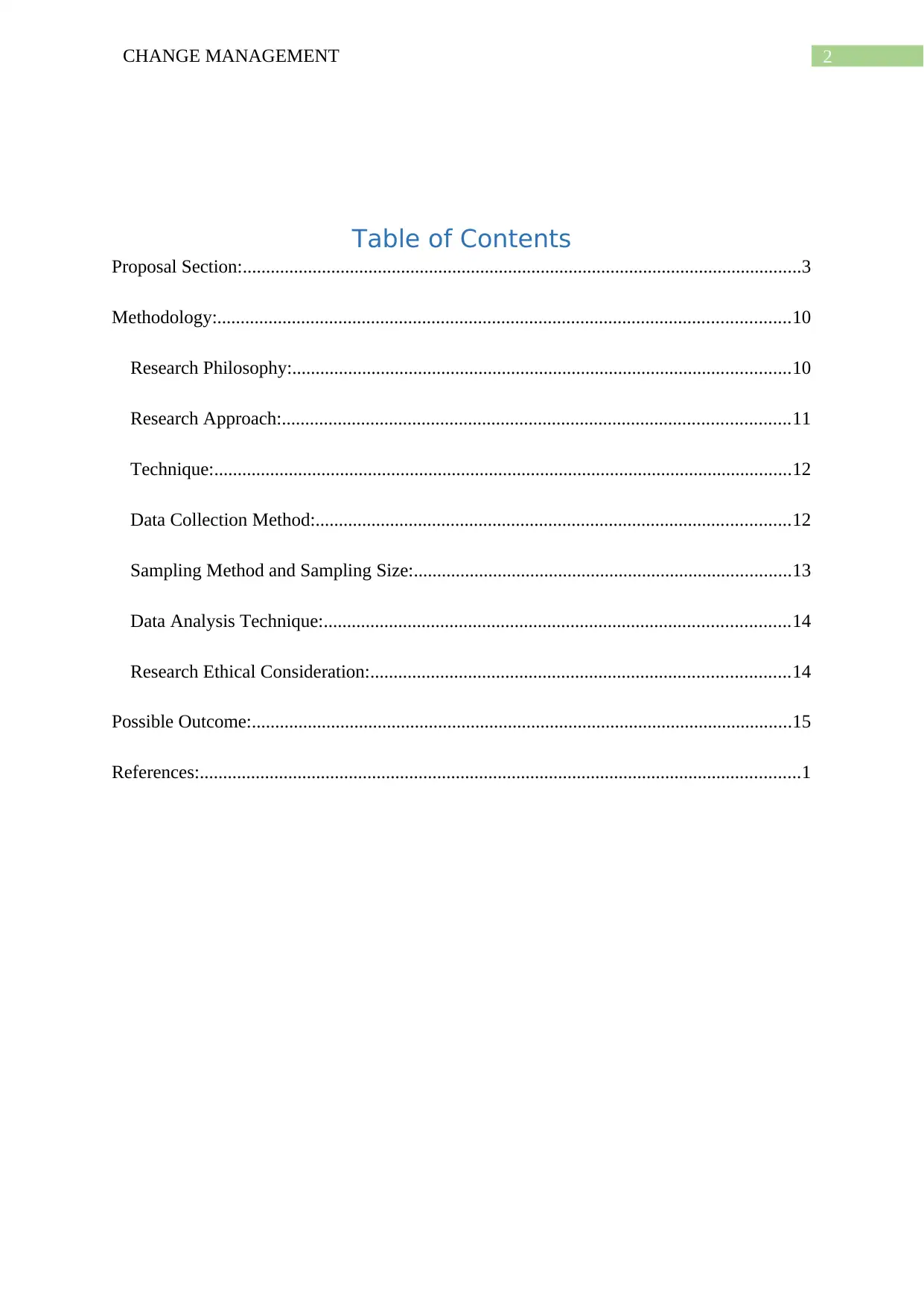
2CHANGE MANAGEMENT
Table of Contents
Proposal Section:........................................................................................................................3
Methodology:...........................................................................................................................10
Research Philosophy:...........................................................................................................10
Research Approach:.............................................................................................................11
Technique:............................................................................................................................12
Data Collection Method:......................................................................................................12
Sampling Method and Sampling Size:.................................................................................13
Data Analysis Technique:....................................................................................................14
Research Ethical Consideration:..........................................................................................14
Possible Outcome:....................................................................................................................15
References:.................................................................................................................................1
Table of Contents
Proposal Section:........................................................................................................................3
Methodology:...........................................................................................................................10
Research Philosophy:...........................................................................................................10
Research Approach:.............................................................................................................11
Technique:............................................................................................................................12
Data Collection Method:......................................................................................................12
Sampling Method and Sampling Size:.................................................................................13
Data Analysis Technique:....................................................................................................14
Research Ethical Consideration:..........................................................................................14
Possible Outcome:....................................................................................................................15
References:.................................................................................................................................1
⊘ This is a preview!⊘
Do you want full access?
Subscribe today to unlock all pages.

Trusted by 1+ million students worldwide
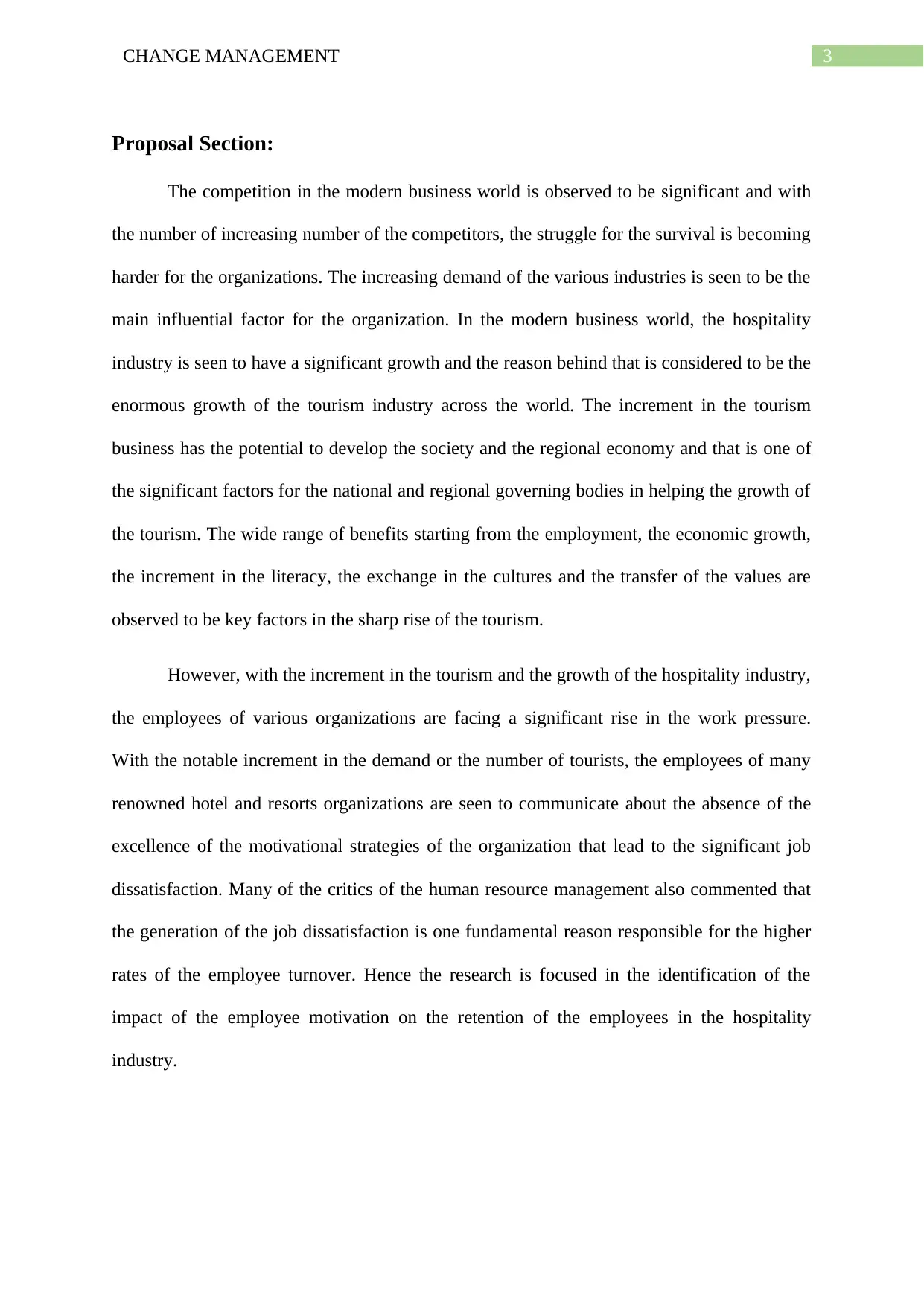
3CHANGE MANAGEMENT
Proposal Section:
The competition in the modern business world is observed to be significant and with
the number of increasing number of the competitors, the struggle for the survival is becoming
harder for the organizations. The increasing demand of the various industries is seen to be the
main influential factor for the organization. In the modern business world, the hospitality
industry is seen to have a significant growth and the reason behind that is considered to be the
enormous growth of the tourism industry across the world. The increment in the tourism
business has the potential to develop the society and the regional economy and that is one of
the significant factors for the national and regional governing bodies in helping the growth of
the tourism. The wide range of benefits starting from the employment, the economic growth,
the increment in the literacy, the exchange in the cultures and the transfer of the values are
observed to be key factors in the sharp rise of the tourism.
However, with the increment in the tourism and the growth of the hospitality industry,
the employees of various organizations are facing a significant rise in the work pressure.
With the notable increment in the demand or the number of tourists, the employees of many
renowned hotel and resorts organizations are seen to communicate about the absence of the
excellence of the motivational strategies of the organization that lead to the significant job
dissatisfaction. Many of the critics of the human resource management also commented that
the generation of the job dissatisfaction is one fundamental reason responsible for the higher
rates of the employee turnover. Hence the research is focused in the identification of the
impact of the employee motivation on the retention of the employees in the hospitality
industry.
Proposal Section:
The competition in the modern business world is observed to be significant and with
the number of increasing number of the competitors, the struggle for the survival is becoming
harder for the organizations. The increasing demand of the various industries is seen to be the
main influential factor for the organization. In the modern business world, the hospitality
industry is seen to have a significant growth and the reason behind that is considered to be the
enormous growth of the tourism industry across the world. The increment in the tourism
business has the potential to develop the society and the regional economy and that is one of
the significant factors for the national and regional governing bodies in helping the growth of
the tourism. The wide range of benefits starting from the employment, the economic growth,
the increment in the literacy, the exchange in the cultures and the transfer of the values are
observed to be key factors in the sharp rise of the tourism.
However, with the increment in the tourism and the growth of the hospitality industry,
the employees of various organizations are facing a significant rise in the work pressure.
With the notable increment in the demand or the number of tourists, the employees of many
renowned hotel and resorts organizations are seen to communicate about the absence of the
excellence of the motivational strategies of the organization that lead to the significant job
dissatisfaction. Many of the critics of the human resource management also commented that
the generation of the job dissatisfaction is one fundamental reason responsible for the higher
rates of the employee turnover. Hence the research is focused in the identification of the
impact of the employee motivation on the retention of the employees in the hospitality
industry.
Paraphrase This Document
Need a fresh take? Get an instant paraphrase of this document with our AI Paraphraser
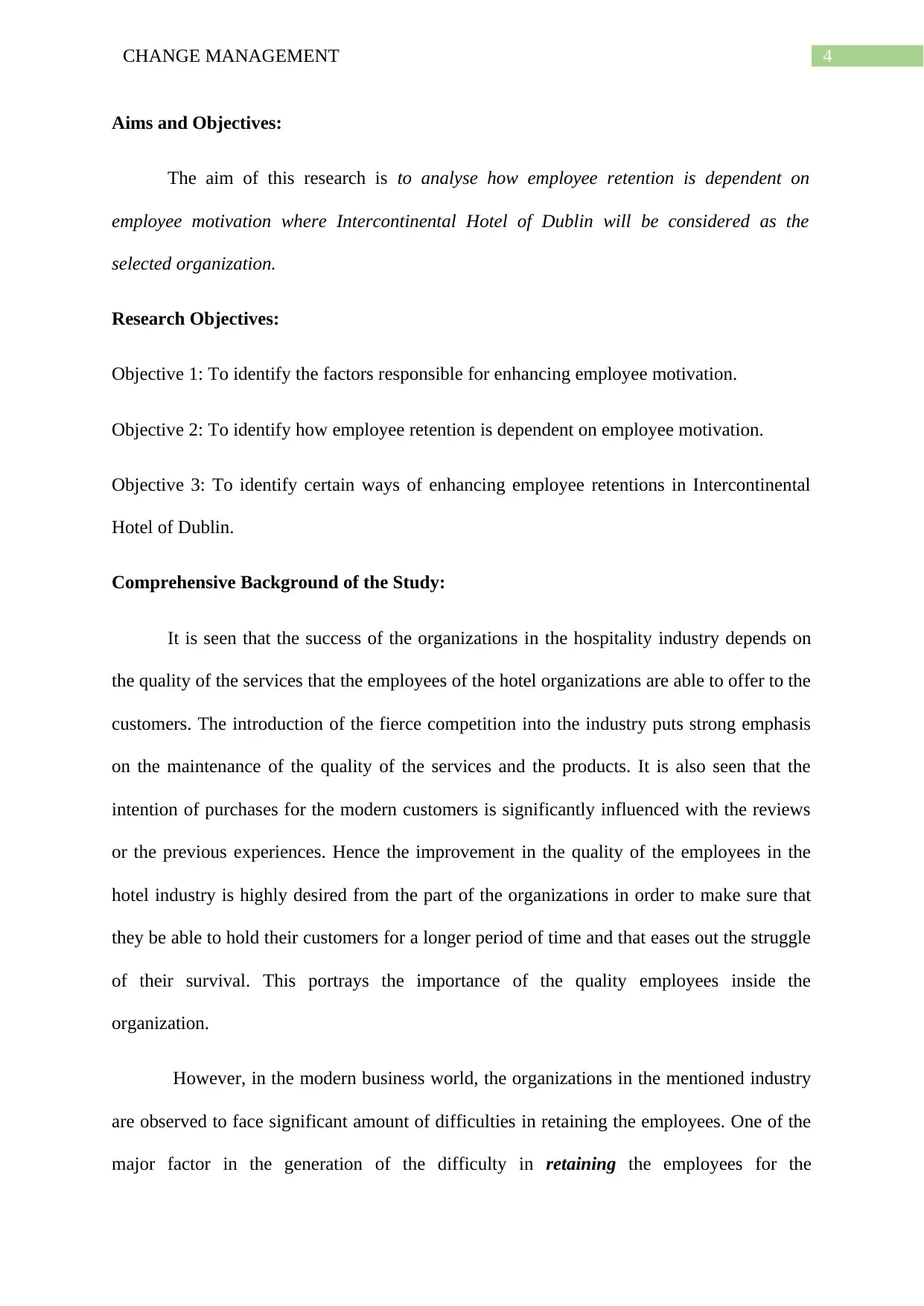
4CHANGE MANAGEMENT
Aims and Objectives:
The aim of this research is to analyse how employee retention is dependent on
employee motivation where Intercontinental Hotel of Dublin will be considered as the
selected organization.
Research Objectives:
Objective 1: To identify the factors responsible for enhancing employee motivation.
Objective 2: To identify how employee retention is dependent on employee motivation.
Objective 3: To identify certain ways of enhancing employee retentions in Intercontinental
Hotel of Dublin.
Comprehensive Background of the Study:
It is seen that the success of the organizations in the hospitality industry depends on
the quality of the services that the employees of the hotel organizations are able to offer to the
customers. The introduction of the fierce competition into the industry puts strong emphasis
on the maintenance of the quality of the services and the products. It is also seen that the
intention of purchases for the modern customers is significantly influenced with the reviews
or the previous experiences. Hence the improvement in the quality of the employees in the
hotel industry is highly desired from the part of the organizations in order to make sure that
they be able to hold their customers for a longer period of time and that eases out the struggle
of their survival. This portrays the importance of the quality employees inside the
organization.
However, in the modern business world, the organizations in the mentioned industry
are observed to face significant amount of difficulties in retaining the employees. One of the
major factor in the generation of the difficulty in retaining the employees for the
Aims and Objectives:
The aim of this research is to analyse how employee retention is dependent on
employee motivation where Intercontinental Hotel of Dublin will be considered as the
selected organization.
Research Objectives:
Objective 1: To identify the factors responsible for enhancing employee motivation.
Objective 2: To identify how employee retention is dependent on employee motivation.
Objective 3: To identify certain ways of enhancing employee retentions in Intercontinental
Hotel of Dublin.
Comprehensive Background of the Study:
It is seen that the success of the organizations in the hospitality industry depends on
the quality of the services that the employees of the hotel organizations are able to offer to the
customers. The introduction of the fierce competition into the industry puts strong emphasis
on the maintenance of the quality of the services and the products. It is also seen that the
intention of purchases for the modern customers is significantly influenced with the reviews
or the previous experiences. Hence the improvement in the quality of the employees in the
hotel industry is highly desired from the part of the organizations in order to make sure that
they be able to hold their customers for a longer period of time and that eases out the struggle
of their survival. This portrays the importance of the quality employees inside the
organization.
However, in the modern business world, the organizations in the mentioned industry
are observed to face significant amount of difficulties in retaining the employees. One of the
major factor in the generation of the difficulty in retaining the employees for the
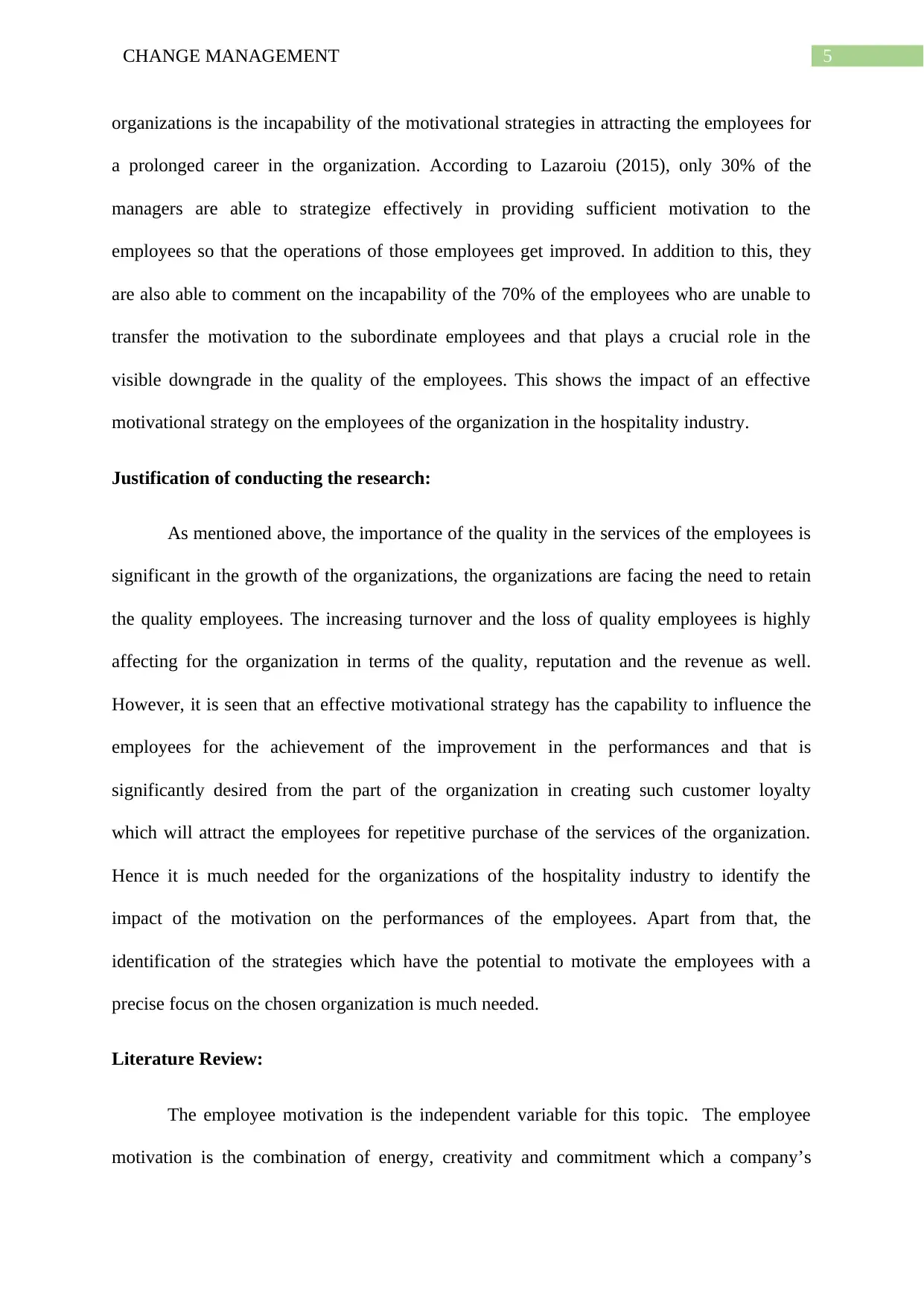
5CHANGE MANAGEMENT
organizations is the incapability of the motivational strategies in attracting the employees for
a prolonged career in the organization. According to Lazaroiu (2015), only 30% of the
managers are able to strategize effectively in providing sufficient motivation to the
employees so that the operations of those employees get improved. In addition to this, they
are also able to comment on the incapability of the 70% of the employees who are unable to
transfer the motivation to the subordinate employees and that plays a crucial role in the
visible downgrade in the quality of the employees. This shows the impact of an effective
motivational strategy on the employees of the organization in the hospitality industry.
Justification of conducting the research:
As mentioned above, the importance of the quality in the services of the employees is
significant in the growth of the organizations, the organizations are facing the need to retain
the quality employees. The increasing turnover and the loss of quality employees is highly
affecting for the organization in terms of the quality, reputation and the revenue as well.
However, it is seen that an effective motivational strategy has the capability to influence the
employees for the achievement of the improvement in the performances and that is
significantly desired from the part of the organization in creating such customer loyalty
which will attract the employees for repetitive purchase of the services of the organization.
Hence it is much needed for the organizations of the hospitality industry to identify the
impact of the motivation on the performances of the employees. Apart from that, the
identification of the strategies which have the potential to motivate the employees with a
precise focus on the chosen organization is much needed.
Literature Review:
The employee motivation is the independent variable for this topic. The employee
motivation is the combination of energy, creativity and commitment which a company’s
organizations is the incapability of the motivational strategies in attracting the employees for
a prolonged career in the organization. According to Lazaroiu (2015), only 30% of the
managers are able to strategize effectively in providing sufficient motivation to the
employees so that the operations of those employees get improved. In addition to this, they
are also able to comment on the incapability of the 70% of the employees who are unable to
transfer the motivation to the subordinate employees and that plays a crucial role in the
visible downgrade in the quality of the employees. This shows the impact of an effective
motivational strategy on the employees of the organization in the hospitality industry.
Justification of conducting the research:
As mentioned above, the importance of the quality in the services of the employees is
significant in the growth of the organizations, the organizations are facing the need to retain
the quality employees. The increasing turnover and the loss of quality employees is highly
affecting for the organization in terms of the quality, reputation and the revenue as well.
However, it is seen that an effective motivational strategy has the capability to influence the
employees for the achievement of the improvement in the performances and that is
significantly desired from the part of the organization in creating such customer loyalty
which will attract the employees for repetitive purchase of the services of the organization.
Hence it is much needed for the organizations of the hospitality industry to identify the
impact of the motivation on the performances of the employees. Apart from that, the
identification of the strategies which have the potential to motivate the employees with a
precise focus on the chosen organization is much needed.
Literature Review:
The employee motivation is the independent variable for this topic. The employee
motivation is the combination of energy, creativity and commitment which a company’s
⊘ This is a preview!⊘
Do you want full access?
Subscribe today to unlock all pages.

Trusted by 1+ million students worldwide
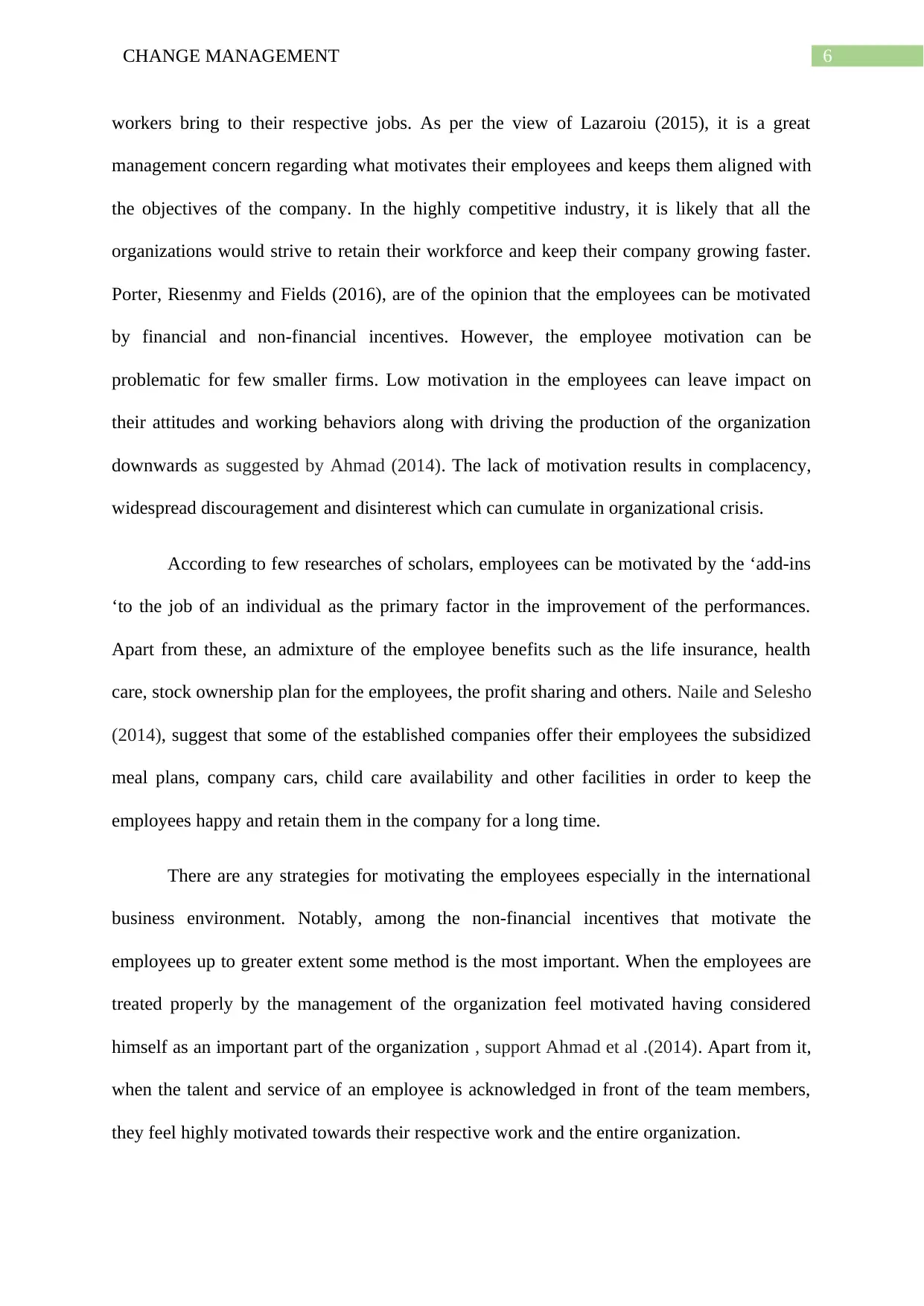
6CHANGE MANAGEMENT
workers bring to their respective jobs. As per the view of Lazaroiu (2015), it is a great
management concern regarding what motivates their employees and keeps them aligned with
the objectives of the company. In the highly competitive industry, it is likely that all the
organizations would strive to retain their workforce and keep their company growing faster.
Porter, Riesenmy and Fields (2016), are of the opinion that the employees can be motivated
by financial and non-financial incentives. However, the employee motivation can be
problematic for few smaller firms. Low motivation in the employees can leave impact on
their attitudes and working behaviors along with driving the production of the organization
downwards as suggested by Ahmad (2014). The lack of motivation results in complacency,
widespread discouragement and disinterest which can cumulate in organizational crisis.
According to few researches of scholars, employees can be motivated by the ‘add-ins
‘to the job of an individual as the primary factor in the improvement of the performances.
Apart from these, an admixture of the employee benefits such as the life insurance, health
care, stock ownership plan for the employees, the profit sharing and others. Naile and Selesho
(2014), suggest that some of the established companies offer their employees the subsidized
meal plans, company cars, child care availability and other facilities in order to keep the
employees happy and retain them in the company for a long time.
There are any strategies for motivating the employees especially in the international
business environment. Notably, among the non-financial incentives that motivate the
employees up to greater extent some method is the most important. When the employees are
treated properly by the management of the organization feel motivated having considered
himself as an important part of the organization , support Ahmad et al .(2014). Apart from it,
when the talent and service of an employee is acknowledged in front of the team members,
they feel highly motivated towards their respective work and the entire organization.
workers bring to their respective jobs. As per the view of Lazaroiu (2015), it is a great
management concern regarding what motivates their employees and keeps them aligned with
the objectives of the company. In the highly competitive industry, it is likely that all the
organizations would strive to retain their workforce and keep their company growing faster.
Porter, Riesenmy and Fields (2016), are of the opinion that the employees can be motivated
by financial and non-financial incentives. However, the employee motivation can be
problematic for few smaller firms. Low motivation in the employees can leave impact on
their attitudes and working behaviors along with driving the production of the organization
downwards as suggested by Ahmad (2014). The lack of motivation results in complacency,
widespread discouragement and disinterest which can cumulate in organizational crisis.
According to few researches of scholars, employees can be motivated by the ‘add-ins
‘to the job of an individual as the primary factor in the improvement of the performances.
Apart from these, an admixture of the employee benefits such as the life insurance, health
care, stock ownership plan for the employees, the profit sharing and others. Naile and Selesho
(2014), suggest that some of the established companies offer their employees the subsidized
meal plans, company cars, child care availability and other facilities in order to keep the
employees happy and retain them in the company for a long time.
There are any strategies for motivating the employees especially in the international
business environment. Notably, among the non-financial incentives that motivate the
employees up to greater extent some method is the most important. When the employees are
treated properly by the management of the organization feel motivated having considered
himself as an important part of the organization , support Ahmad et al .(2014). Apart from it,
when the talent and service of an employee is acknowledged in front of the team members,
they feel highly motivated towards their respective work and the entire organization.
Paraphrase This Document
Need a fresh take? Get an instant paraphrase of this document with our AI Paraphraser
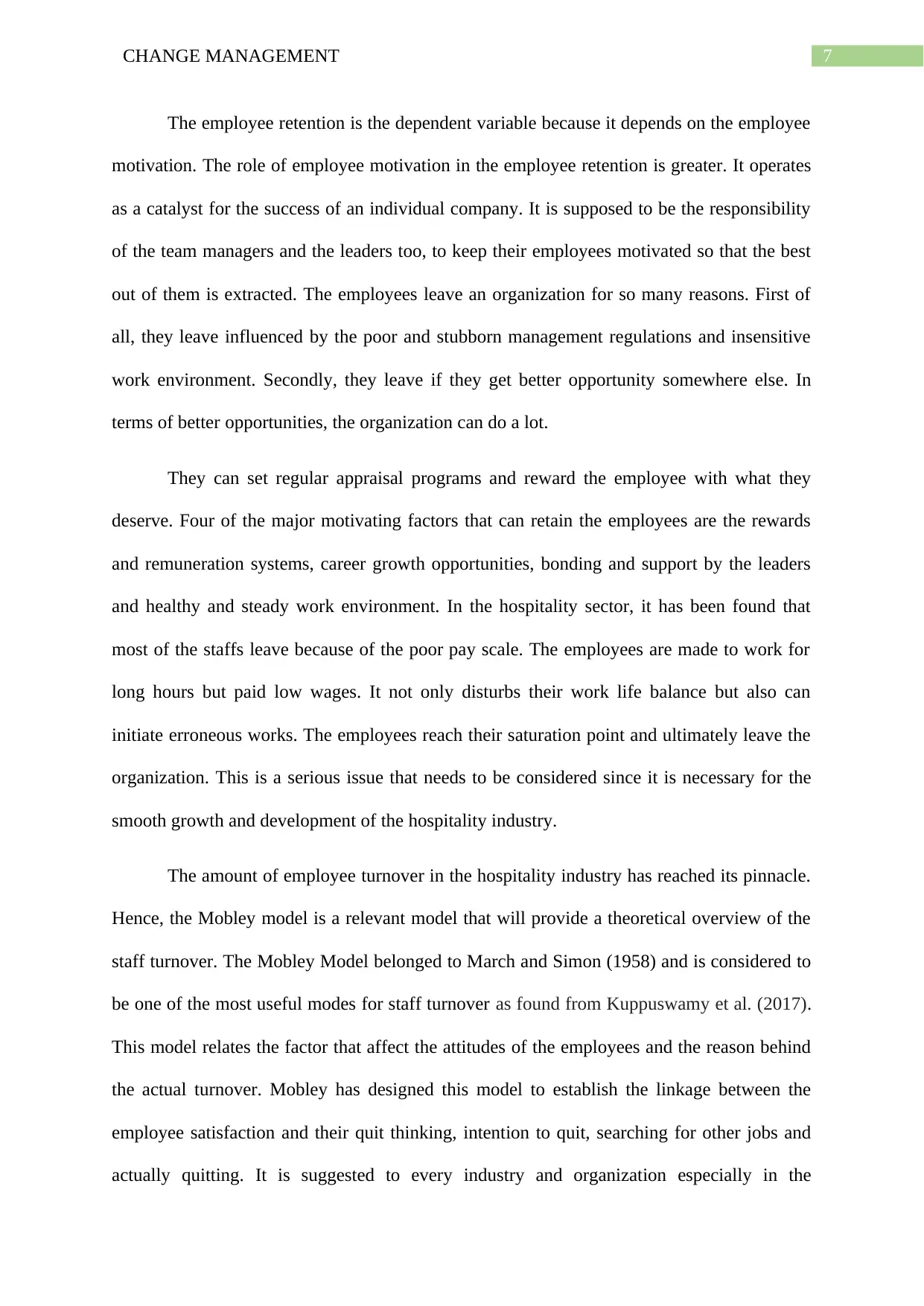
7CHANGE MANAGEMENT
The employee retention is the dependent variable because it depends on the employee
motivation. The role of employee motivation in the employee retention is greater. It operates
as a catalyst for the success of an individual company. It is supposed to be the responsibility
of the team managers and the leaders too, to keep their employees motivated so that the best
out of them is extracted. The employees leave an organization for so many reasons. First of
all, they leave influenced by the poor and stubborn management regulations and insensitive
work environment. Secondly, they leave if they get better opportunity somewhere else. In
terms of better opportunities, the organization can do a lot.
They can set regular appraisal programs and reward the employee with what they
deserve. Four of the major motivating factors that can retain the employees are the rewards
and remuneration systems, career growth opportunities, bonding and support by the leaders
and healthy and steady work environment. In the hospitality sector, it has been found that
most of the staffs leave because of the poor pay scale. The employees are made to work for
long hours but paid low wages. It not only disturbs their work life balance but also can
initiate erroneous works. The employees reach their saturation point and ultimately leave the
organization. This is a serious issue that needs to be considered since it is necessary for the
smooth growth and development of the hospitality industry.
The amount of employee turnover in the hospitality industry has reached its pinnacle.
Hence, the Mobley model is a relevant model that will provide a theoretical overview of the
staff turnover. The Mobley Model belonged to March and Simon (1958) and is considered to
be one of the most useful modes for staff turnover as found from Kuppuswamy et al. (2017).
This model relates the factor that affect the attitudes of the employees and the reason behind
the actual turnover. Mobley has designed this model to establish the linkage between the
employee satisfaction and their quit thinking, intention to quit, searching for other jobs and
actually quitting. It is suggested to every industry and organization especially in the
The employee retention is the dependent variable because it depends on the employee
motivation. The role of employee motivation in the employee retention is greater. It operates
as a catalyst for the success of an individual company. It is supposed to be the responsibility
of the team managers and the leaders too, to keep their employees motivated so that the best
out of them is extracted. The employees leave an organization for so many reasons. First of
all, they leave influenced by the poor and stubborn management regulations and insensitive
work environment. Secondly, they leave if they get better opportunity somewhere else. In
terms of better opportunities, the organization can do a lot.
They can set regular appraisal programs and reward the employee with what they
deserve. Four of the major motivating factors that can retain the employees are the rewards
and remuneration systems, career growth opportunities, bonding and support by the leaders
and healthy and steady work environment. In the hospitality sector, it has been found that
most of the staffs leave because of the poor pay scale. The employees are made to work for
long hours but paid low wages. It not only disturbs their work life balance but also can
initiate erroneous works. The employees reach their saturation point and ultimately leave the
organization. This is a serious issue that needs to be considered since it is necessary for the
smooth growth and development of the hospitality industry.
The amount of employee turnover in the hospitality industry has reached its pinnacle.
Hence, the Mobley model is a relevant model that will provide a theoretical overview of the
staff turnover. The Mobley Model belonged to March and Simon (1958) and is considered to
be one of the most useful modes for staff turnover as found from Kuppuswamy et al. (2017).
This model relates the factor that affect the attitudes of the employees and the reason behind
the actual turnover. Mobley has designed this model to establish the linkage between the
employee satisfaction and their quit thinking, intention to quit, searching for other jobs and
actually quitting. It is suggested to every industry and organization especially in the
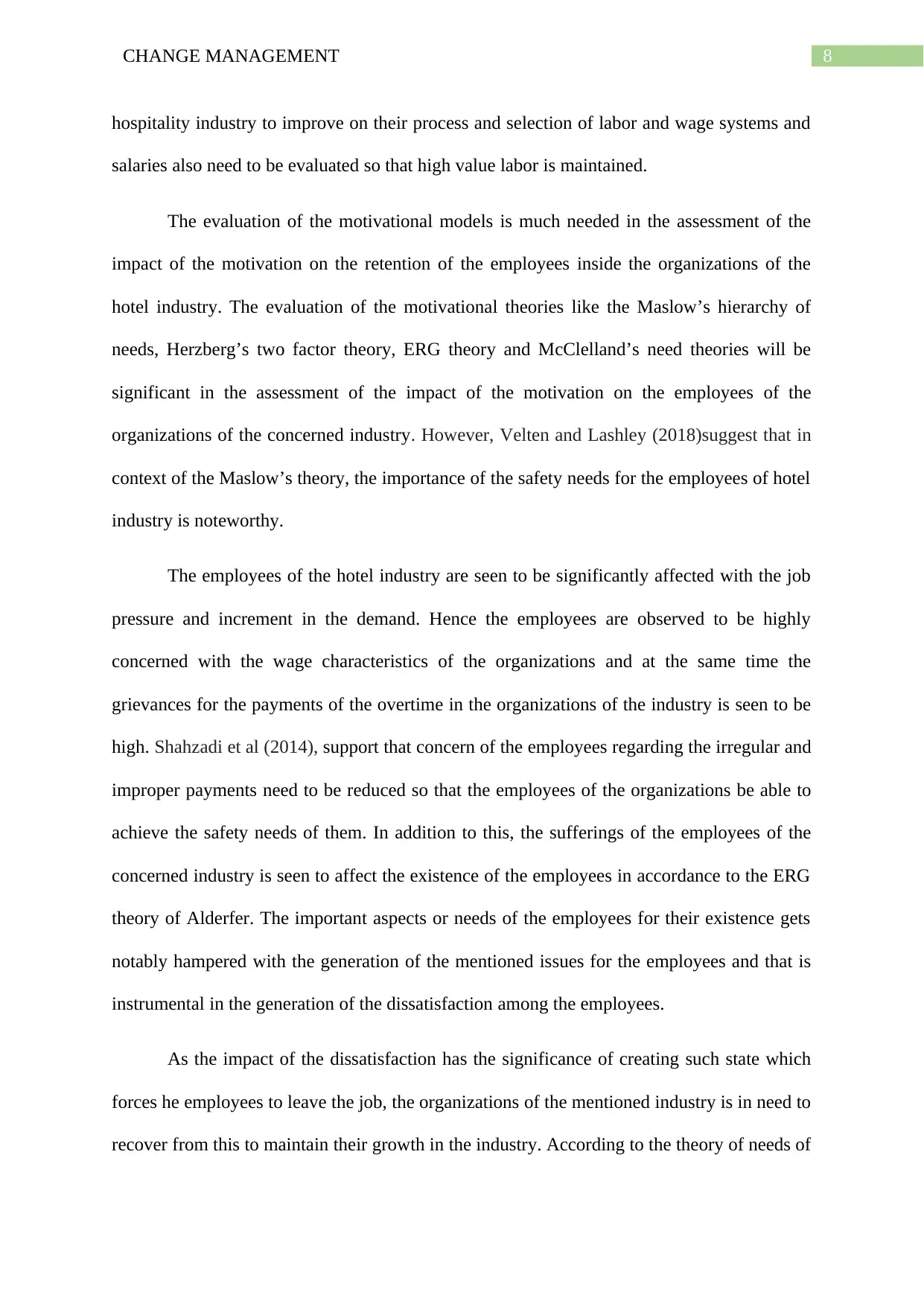
8CHANGE MANAGEMENT
hospitality industry to improve on their process and selection of labor and wage systems and
salaries also need to be evaluated so that high value labor is maintained.
The evaluation of the motivational models is much needed in the assessment of the
impact of the motivation on the retention of the employees inside the organizations of the
hotel industry. The evaluation of the motivational theories like the Maslow’s hierarchy of
needs, Herzberg’s two factor theory, ERG theory and McClelland’s need theories will be
significant in the assessment of the impact of the motivation on the employees of the
organizations of the concerned industry. However, Velten and Lashley (2018)suggest that in
context of the Maslow’s theory, the importance of the safety needs for the employees of hotel
industry is noteworthy.
The employees of the hotel industry are seen to be significantly affected with the job
pressure and increment in the demand. Hence the employees are observed to be highly
concerned with the wage characteristics of the organizations and at the same time the
grievances for the payments of the overtime in the organizations of the industry is seen to be
high. Shahzadi et al (2014), support that concern of the employees regarding the irregular and
improper payments need to be reduced so that the employees of the organizations be able to
achieve the safety needs of them. In addition to this, the sufferings of the employees of the
concerned industry is seen to affect the existence of the employees in accordance to the ERG
theory of Alderfer. The important aspects or needs of the employees for their existence gets
notably hampered with the generation of the mentioned issues for the employees and that is
instrumental in the generation of the dissatisfaction among the employees.
As the impact of the dissatisfaction has the significance of creating such state which
forces he employees to leave the job, the organizations of the mentioned industry is in need to
recover from this to maintain their growth in the industry. According to the theory of needs of
hospitality industry to improve on their process and selection of labor and wage systems and
salaries also need to be evaluated so that high value labor is maintained.
The evaluation of the motivational models is much needed in the assessment of the
impact of the motivation on the retention of the employees inside the organizations of the
hotel industry. The evaluation of the motivational theories like the Maslow’s hierarchy of
needs, Herzberg’s two factor theory, ERG theory and McClelland’s need theories will be
significant in the assessment of the impact of the motivation on the employees of the
organizations of the concerned industry. However, Velten and Lashley (2018)suggest that in
context of the Maslow’s theory, the importance of the safety needs for the employees of hotel
industry is noteworthy.
The employees of the hotel industry are seen to be significantly affected with the job
pressure and increment in the demand. Hence the employees are observed to be highly
concerned with the wage characteristics of the organizations and at the same time the
grievances for the payments of the overtime in the organizations of the industry is seen to be
high. Shahzadi et al (2014), support that concern of the employees regarding the irregular and
improper payments need to be reduced so that the employees of the organizations be able to
achieve the safety needs of them. In addition to this, the sufferings of the employees of the
concerned industry is seen to affect the existence of the employees in accordance to the ERG
theory of Alderfer. The important aspects or needs of the employees for their existence gets
notably hampered with the generation of the mentioned issues for the employees and that is
instrumental in the generation of the dissatisfaction among the employees.
As the impact of the dissatisfaction has the significance of creating such state which
forces he employees to leave the job, the organizations of the mentioned industry is in need to
recover from this to maintain their growth in the industry. According to the theory of needs of
⊘ This is a preview!⊘
Do you want full access?
Subscribe today to unlock all pages.

Trusted by 1+ million students worldwide
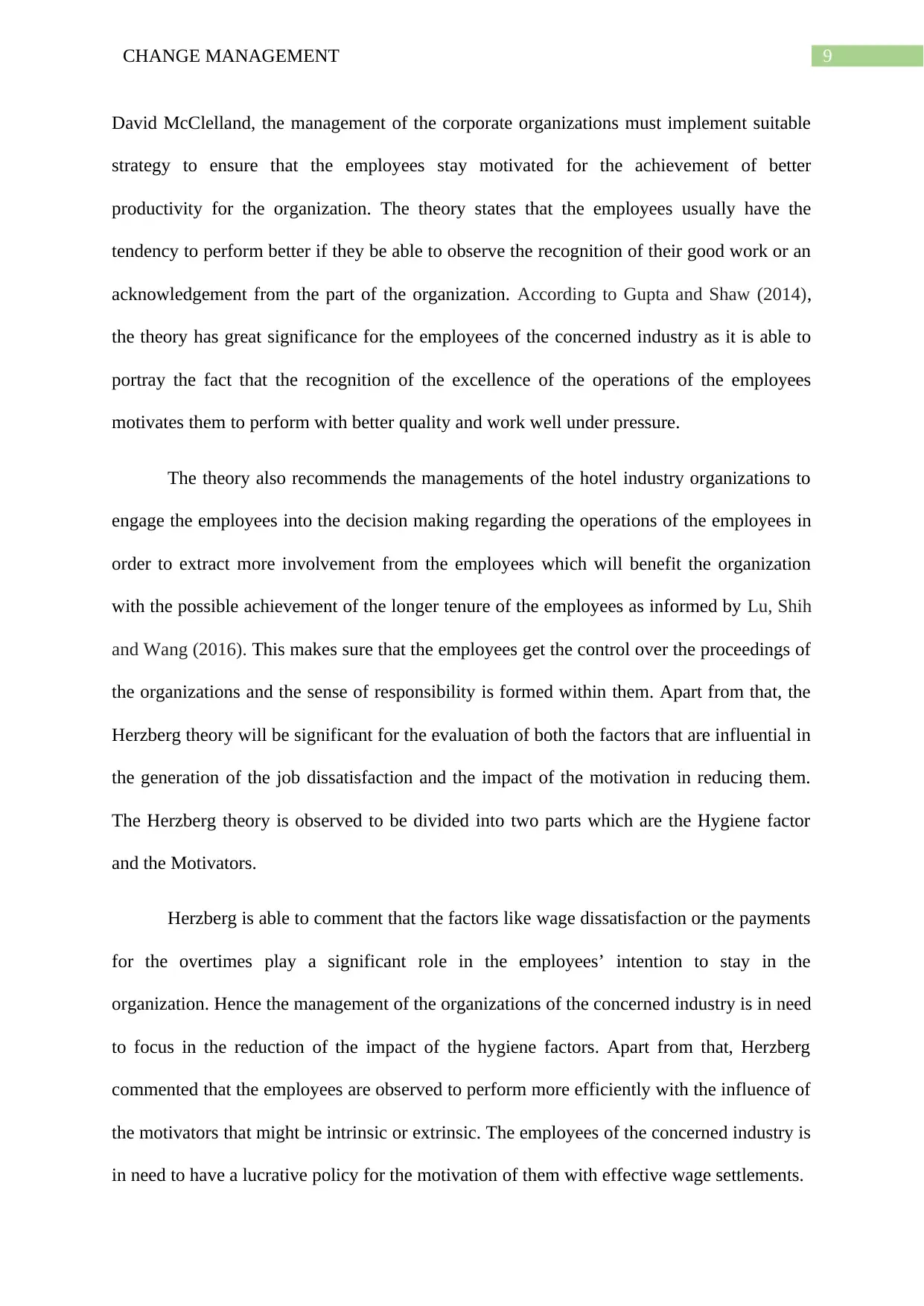
9CHANGE MANAGEMENT
David McClelland, the management of the corporate organizations must implement suitable
strategy to ensure that the employees stay motivated for the achievement of better
productivity for the organization. The theory states that the employees usually have the
tendency to perform better if they be able to observe the recognition of their good work or an
acknowledgement from the part of the organization. According to Gupta and Shaw (2014),
the theory has great significance for the employees of the concerned industry as it is able to
portray the fact that the recognition of the excellence of the operations of the employees
motivates them to perform with better quality and work well under pressure.
The theory also recommends the managements of the hotel industry organizations to
engage the employees into the decision making regarding the operations of the employees in
order to extract more involvement from the employees which will benefit the organization
with the possible achievement of the longer tenure of the employees as informed by Lu, Shih
and Wang (2016). This makes sure that the employees get the control over the proceedings of
the organizations and the sense of responsibility is formed within them. Apart from that, the
Herzberg theory will be significant for the evaluation of both the factors that are influential in
the generation of the job dissatisfaction and the impact of the motivation in reducing them.
The Herzberg theory is observed to be divided into two parts which are the Hygiene factor
and the Motivators.
Herzberg is able to comment that the factors like wage dissatisfaction or the payments
for the overtimes play a significant role in the employees’ intention to stay in the
organization. Hence the management of the organizations of the concerned industry is in need
to focus in the reduction of the impact of the hygiene factors. Apart from that, Herzberg
commented that the employees are observed to perform more efficiently with the influence of
the motivators that might be intrinsic or extrinsic. The employees of the concerned industry is
in need to have a lucrative policy for the motivation of them with effective wage settlements.
David McClelland, the management of the corporate organizations must implement suitable
strategy to ensure that the employees stay motivated for the achievement of better
productivity for the organization. The theory states that the employees usually have the
tendency to perform better if they be able to observe the recognition of their good work or an
acknowledgement from the part of the organization. According to Gupta and Shaw (2014),
the theory has great significance for the employees of the concerned industry as it is able to
portray the fact that the recognition of the excellence of the operations of the employees
motivates them to perform with better quality and work well under pressure.
The theory also recommends the managements of the hotel industry organizations to
engage the employees into the decision making regarding the operations of the employees in
order to extract more involvement from the employees which will benefit the organization
with the possible achievement of the longer tenure of the employees as informed by Lu, Shih
and Wang (2016). This makes sure that the employees get the control over the proceedings of
the organizations and the sense of responsibility is formed within them. Apart from that, the
Herzberg theory will be significant for the evaluation of both the factors that are influential in
the generation of the job dissatisfaction and the impact of the motivation in reducing them.
The Herzberg theory is observed to be divided into two parts which are the Hygiene factor
and the Motivators.
Herzberg is able to comment that the factors like wage dissatisfaction or the payments
for the overtimes play a significant role in the employees’ intention to stay in the
organization. Hence the management of the organizations of the concerned industry is in need
to focus in the reduction of the impact of the hygiene factors. Apart from that, Herzberg
commented that the employees are observed to perform more efficiently with the influence of
the motivators that might be intrinsic or extrinsic. The employees of the concerned industry is
in need to have a lucrative policy for the motivation of them with effective wage settlements.
Paraphrase This Document
Need a fresh take? Get an instant paraphrase of this document with our AI Paraphraser
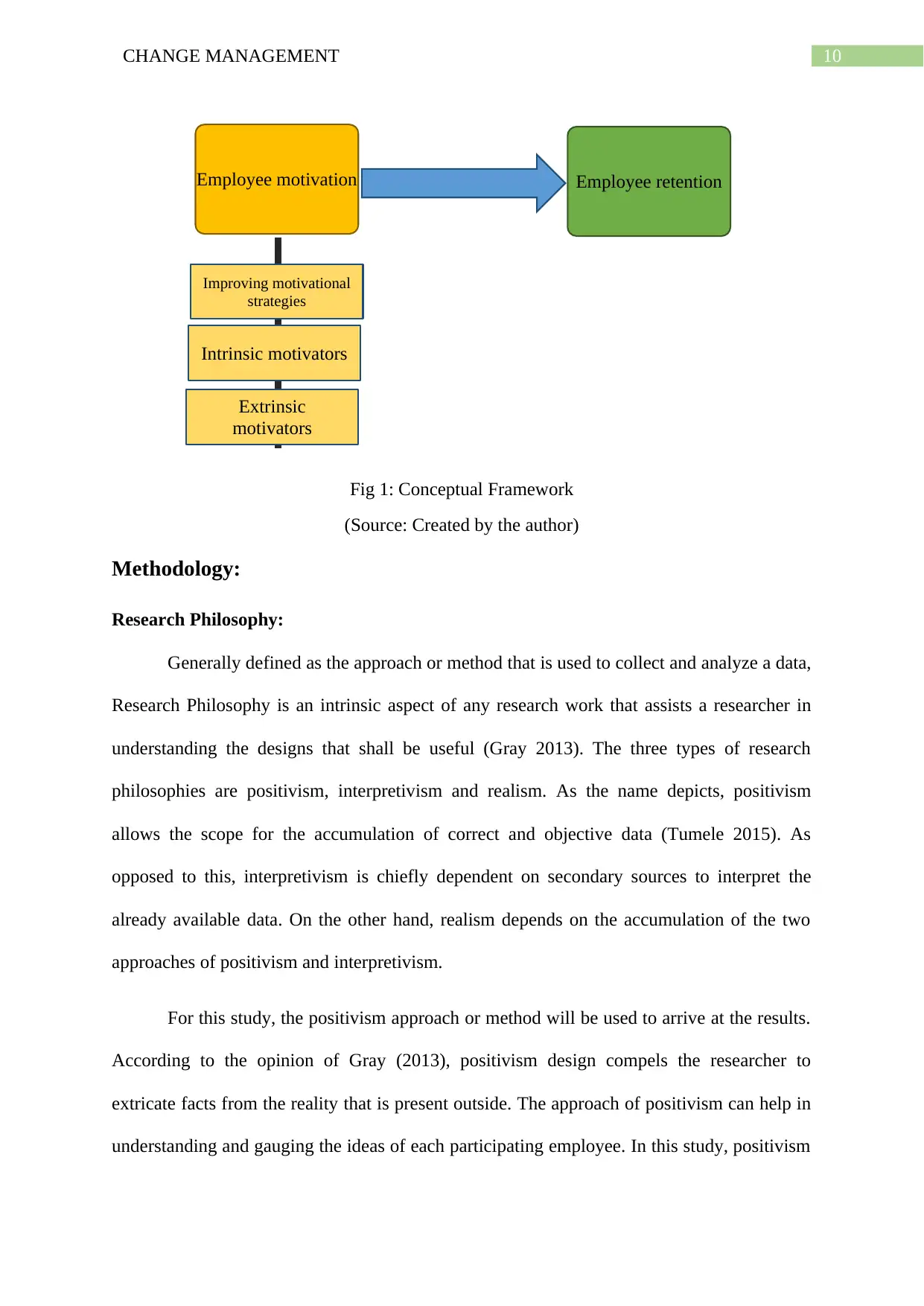
10CHANGE MANAGEMENT
Employee motivation Employee retention
Improving motivational
strategies
Extrinsic
motivators
Intrinsic motivators
Fig 1: Conceptual Framework
(Source: Created by the author)
Methodology:
Research Philosophy:
Generally defined as the approach or method that is used to collect and analyze a data,
Research Philosophy is an intrinsic aspect of any research work that assists a researcher in
understanding the designs that shall be useful (Gray 2013). The three types of research
philosophies are positivism, interpretivism and realism. As the name depicts, positivism
allows the scope for the accumulation of correct and objective data (Tumele 2015). As
opposed to this, interpretivism is chiefly dependent on secondary sources to interpret the
already available data. On the other hand, realism depends on the accumulation of the two
approaches of positivism and interpretivism.
For this study, the positivism approach or method will be used to arrive at the results.
According to the opinion of Gray (2013), positivism design compels the researcher to
extricate facts from the reality that is present outside. The approach of positivism can help in
understanding and gauging the ideas of each participating employee. In this study, positivism
Employee motivation Employee retention
Improving motivational
strategies
Extrinsic
motivators
Intrinsic motivators
Fig 1: Conceptual Framework
(Source: Created by the author)
Methodology:
Research Philosophy:
Generally defined as the approach or method that is used to collect and analyze a data,
Research Philosophy is an intrinsic aspect of any research work that assists a researcher in
understanding the designs that shall be useful (Gray 2013). The three types of research
philosophies are positivism, interpretivism and realism. As the name depicts, positivism
allows the scope for the accumulation of correct and objective data (Tumele 2015). As
opposed to this, interpretivism is chiefly dependent on secondary sources to interpret the
already available data. On the other hand, realism depends on the accumulation of the two
approaches of positivism and interpretivism.
For this study, the positivism approach or method will be used to arrive at the results.
According to the opinion of Gray (2013), positivism design compels the researcher to
extricate facts from the reality that is present outside. The approach of positivism can help in
understanding and gauging the ideas of each participating employee. In this study, positivism
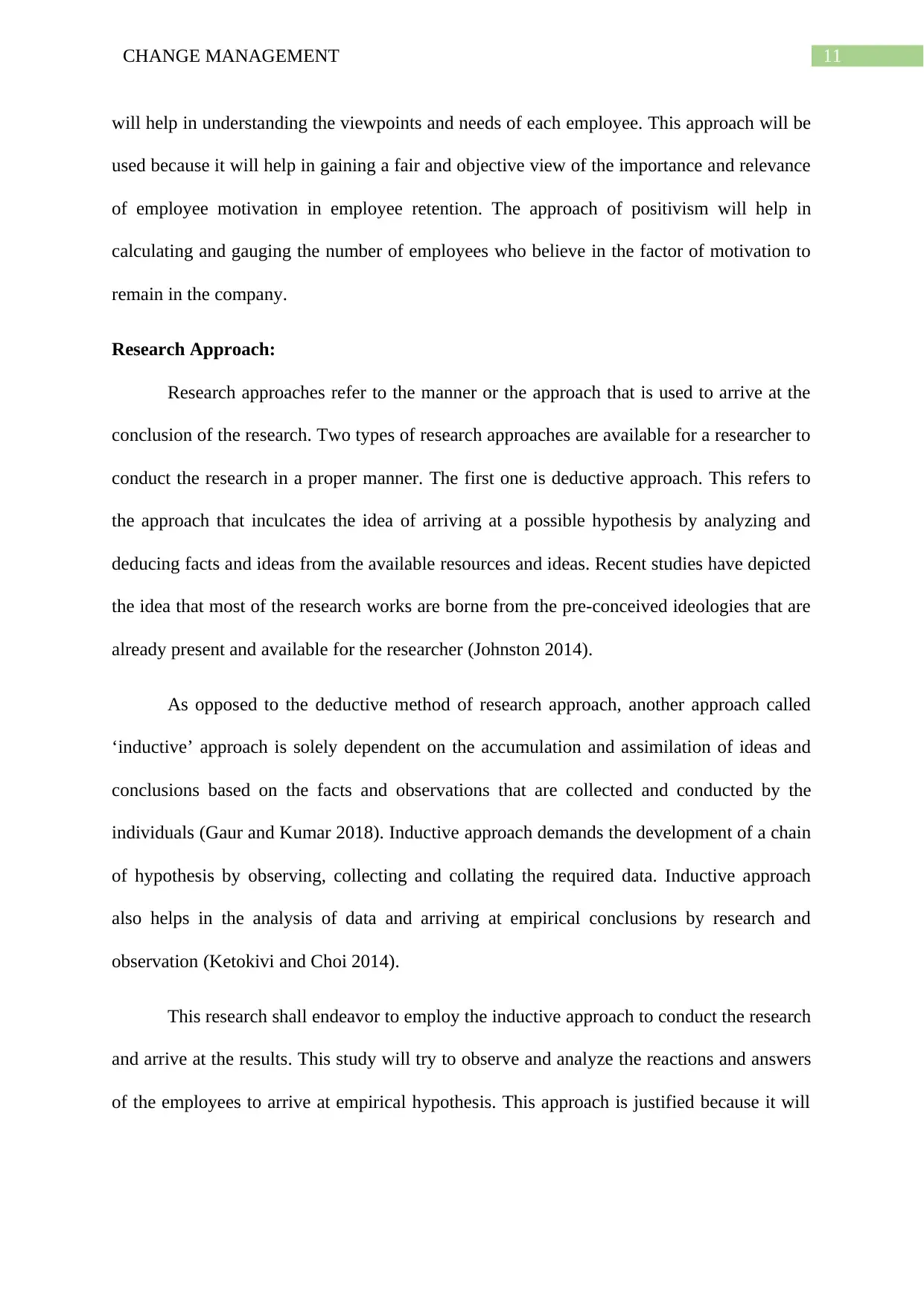
11CHANGE MANAGEMENT
will help in understanding the viewpoints and needs of each employee. This approach will be
used because it will help in gaining a fair and objective view of the importance and relevance
of employee motivation in employee retention. The approach of positivism will help in
calculating and gauging the number of employees who believe in the factor of motivation to
remain in the company.
Research Approach:
Research approaches refer to the manner or the approach that is used to arrive at the
conclusion of the research. Two types of research approaches are available for a researcher to
conduct the research in a proper manner. The first one is deductive approach. This refers to
the approach that inculcates the idea of arriving at a possible hypothesis by analyzing and
deducing facts and ideas from the available resources and ideas. Recent studies have depicted
the idea that most of the research works are borne from the pre-conceived ideologies that are
already present and available for the researcher (Johnston 2014).
As opposed to the deductive method of research approach, another approach called
‘inductive’ approach is solely dependent on the accumulation and assimilation of ideas and
conclusions based on the facts and observations that are collected and conducted by the
individuals (Gaur and Kumar 2018). Inductive approach demands the development of a chain
of hypothesis by observing, collecting and collating the required data. Inductive approach
also helps in the analysis of data and arriving at empirical conclusions by research and
observation (Ketokivi and Choi 2014).
This research shall endeavor to employ the inductive approach to conduct the research
and arrive at the results. This study will try to observe and analyze the reactions and answers
of the employees to arrive at empirical hypothesis. This approach is justified because it will
will help in understanding the viewpoints and needs of each employee. This approach will be
used because it will help in gaining a fair and objective view of the importance and relevance
of employee motivation in employee retention. The approach of positivism will help in
calculating and gauging the number of employees who believe in the factor of motivation to
remain in the company.
Research Approach:
Research approaches refer to the manner or the approach that is used to arrive at the
conclusion of the research. Two types of research approaches are available for a researcher to
conduct the research in a proper manner. The first one is deductive approach. This refers to
the approach that inculcates the idea of arriving at a possible hypothesis by analyzing and
deducing facts and ideas from the available resources and ideas. Recent studies have depicted
the idea that most of the research works are borne from the pre-conceived ideologies that are
already present and available for the researcher (Johnston 2014).
As opposed to the deductive method of research approach, another approach called
‘inductive’ approach is solely dependent on the accumulation and assimilation of ideas and
conclusions based on the facts and observations that are collected and conducted by the
individuals (Gaur and Kumar 2018). Inductive approach demands the development of a chain
of hypothesis by observing, collecting and collating the required data. Inductive approach
also helps in the analysis of data and arriving at empirical conclusions by research and
observation (Ketokivi and Choi 2014).
This research shall endeavor to employ the inductive approach to conduct the research
and arrive at the results. This study will try to observe and analyze the reactions and answers
of the employees to arrive at empirical hypothesis. This approach is justified because it will
⊘ This is a preview!⊘
Do you want full access?
Subscribe today to unlock all pages.

Trusted by 1+ million students worldwide
1 out of 19
Related Documents
Your All-in-One AI-Powered Toolkit for Academic Success.
+13062052269
info@desklib.com
Available 24*7 on WhatsApp / Email
![[object Object]](/_next/static/media/star-bottom.7253800d.svg)
Unlock your academic potential
Copyright © 2020–2026 A2Z Services. All Rights Reserved. Developed and managed by ZUCOL.





